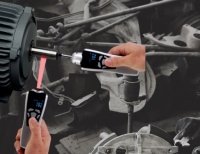What Is An Ultrasonic Thickness Tester?

An ultrasonic thickness tester is a sophisticated tool often used in industrial environments. This article focuses attention on ultrasonic thickness testers, what they are, their advantages and disadvantages and provides common examples of their use.
What is an Ultrasonic Thickness Tester?
An ultrasonic thickness tester, also known as a thickness gauge, employs a non-destructive method to determine the thickness of a component or material.
How do Ultrasonic Thickness Testers Work?
Ultrasonic thickness testers determine sample thickness by measuring the amount of time it takes for sound to cross from the sensors transducer through the measured material and back to the transducer. The ultrasonic thickness tester will then rapidly and automatically calculate the data based on the speed of the sound through the tested sample and display the resulting measurement on an LCD.
There are several advantages and disadvantages of ultrasonic thickness testers.
Ultrasonic Thickness Testers |
|
|
Advantages |
Disadvantages |
|
+ Non-destructive measurements. + Access to both sides of the sample is not required. + The sensors can be engineered or calibrated to measure and cope with coatings and linings.
|
- Usually requires calibration to specific materials. - The sensors require good contact with the surface area to be measured. - Coupling material between the measured surface and the probe is often required. |
Applications for Ultrasonic Thickness Testers
Ultrasonic thickness testers are used to check material thickness and properties regularly throughout many industry applications. Common examples include the measurement of:
- Metal thickness
- Corrosion monitoring
- Wall thickness
- Casting/moulding thickness testing
- Paint and coating thickness; and
- Plastic thickness.
Ultrasonic Thickness Tester Examples
The scientists have put together three examples of the most popular ultrasonic thickness testers available at Instrument Choice.
WT2110 Coating Thickness Gauge
|
GT235 Coating Thickness Gauge
|
Ultrasonic Wall Thickness Gauge
|
|
1. Steel 4340 |
6. PVC |
- User-enabled, straightforward two-point calibration helps to optimise linearity over a wide measurement range.
- The easy to use scan mode performs 100 readings per second. Users can slide the sensor over a large measuring area, and the minimum thickness measured will display.
- Adjustable GAIN in 5 steps to fine-tune the gauge for use on challenging materials or applications.
For more features, click here
Key specifications
- Measurement range: With included transducer: 0.60-150.00 mm/ total instrument range depending on material/transducer type: 0.63-914.40 mm
- Resolution: 0.01mm
- Minimum Sample Diameter:3.8 mm
- Minimum radius for convex and concave surfaces: convex 8.89mm/ concave: 76.2mm
- Minimum Headroom: 25.0 mm.
For more specifications, click here
Conclusion
Ultrasonic thickness testers are straightforward, non-destructive meters that measure the thickness of various materials.
Need more information on ultrasonic thickness testers? Need advice on the best meter for your application? Speak with an Instrument Choice Scientist! Call 1300 737 871 or email [email protected].
Also interesting
When used correctly, digital infrared thermometers provide rapid and accurate surface temperature measurements. So you can always get the best results from your meter, our scientists have banded together and assembled a list of tips to ensure you make reliable measurements.
Get the exclusive measuring tips from Instrument Choice Scientists here

Digital tachometers are specially designed instruments for the measurement of rotational speed. Unfortunately, a vast array of digital tachometers available makes finding the best for your application can become challenging. For this reason, our scientists have created a list of five helpful tips that will help find the ideal digital tachometer for your application.
Get the exclusive list here

